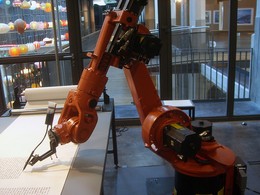Mirko Tobias Schäfer / Assistant Professor
University of Utrecht Department for Media and Culture Studies
Mirko Tobias Schäfer / Assistant Professor
University of Utrecht Department for Media and Culture Studies
My contribution to the project will be twofold: In an ongoing discussion with Tarasiewicz's team at the Artistic Technology Research Lab I will revisit 'artistic research' and investigate the various methods and practices employed in creative processes. Secondly, I will observe new media art projects and the ways media artist's work with technology in order to think about technology development and innovation. This refers to my earlier research on hacking communities, where the often accidental and even unsolicited participation of users lead to technological innovation.
Artistic research is a controversial term that actually marks a number of trends in art education and society. It is symptomatic for the process of 'academization' of art schools. Economic circumstances and political interference have cornered art schools between creative industries and academia. In times of shrinking budgets art schools increasingly compete for research budgets from the academic sector as well as from applied research. The alleged proximity to creative industry might not only appear tempting to policy makers but also provides alumni with a career opportunity other than art. However, it remains controversial whether it is desirable to emphasise the crafts over the arts in art schools. In terms of research it remains undeniable that the so-called 'pratice based PhD' has earned no credibility in academia so far. Artistic research might be useful denomination meeting expectations of grant committees and policy makers, but it also might be as well inappropriate to describe the diverse processes of knowledge creation in artistic creation.
Another reason for the growing interest in 'artistic research' is caused in a wider attention for science and its popularization in public discourses. Climate research, biotechnology, genetics are areas that become increasingly domains of socio-political concerns. Artists are here provided with rich topics and challenging material to work with. Processes similar to research are unavoidable for artists interested in these domains. Working closely with technology also requires processes of acquiring knowledge. It is therefore unsurprising 'artistic research' is understood as essential to new media art. However, it remains disputable whether those processes are equivalent to the formalized and structured research methods developed in scholarly and scientific disciplines or those employed in corporate research and engineering. In our investigation of art projects we will map the research practices used to approach this question.
Apart from the institutional focus framing of 'artistic research' and the practical need for research in order to put new technologies to work as mentioned above, a third aspect of 'artistic research' is to be acknowledged: the act of creation as a 'research process', rather than the production of a finished art work. Here, with an implicit reference to concept art, the process of research becomes the core aspect of the creative work. The process of researching employing specific skills, tacit knowledge, the practices and methods of artistic creation becomes detached from the single work of art. It often constitutes a form of knowledge creation, often related to socio-political debates and raises awareness for social, political and environmental issues. As such it could become one of the last areas where critique is formulated, visions are composed, and the status quo is questioned. This is the intersection between technology, politics and arts where technological innovation meets concepts of social progress.
In order to evade the exhausting debate whether artists conduct research and whether these practices can be benchmarked with established scientific and scholarly methods. Instead we plan to review work processes of artists and designers and to investigate the distinctive practices of creative work. Allocating the different ways these participants approach material, discourses and knowledge resources, as well as the way methods are used for documenting the work processes will provide insights into distinctive epistemic cultures. Tarasiewicz's team provides a great ressource. With their previously organised festival series Coded Cultures, a large inventory of work, artists and practices is already under way. Their 2011 publication Coded Cultures: New Creative Practices out of Diversity is a cornucopia of interdisciplinary collaborations crossing art, science and engineering. The attempt is made not only to situate research as an essential element within these practices but also to frame them as inherently critical. The project participants claim in their research proposal that “Art does not only reflect new technologies and how they transform society, art is also a crucial laboratory for the development of technology itself and for critical discourse.” I am looking forward to delve into these networks of creative work and to investigate their epistemic qualities and their critical potential.
Date September 2012 Category News

Recently I have been appointed research fellow at the University of Applied Arts in Vienna. During the coming year I will participate in a research project that deals with the controversial issue of 'artistic research'. The fellowship is part of a prestigious PEEK grant awarded to Austrian media artist and curator Matthias Tarasiewicz by the Austrian Science Fund. I was awarded a so-called PEEK-Visit, a research fellowship for a visiting professor limited to six month spread over a period of two years.